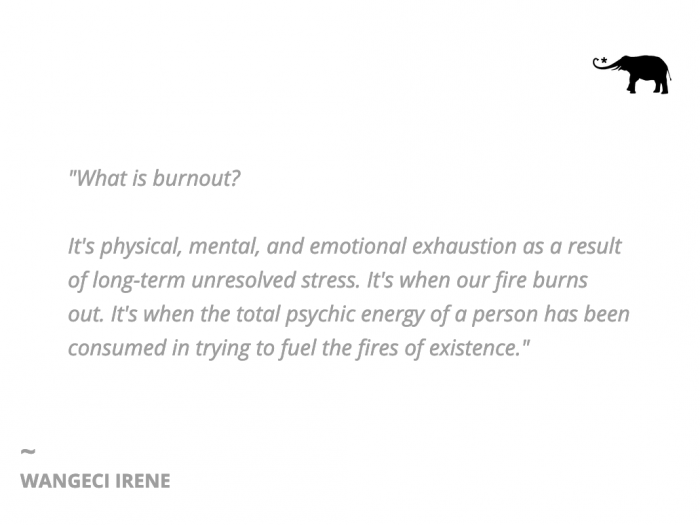I was having headaches, losing interest in my work, meeting my targets became too demanding, and the ease of doing routine activities was fading away.
My school timetable was too much for me to handle, and I lagged in assignment submissions. Self-care was becoming an uphill task. I was just there, for lack of a word to describe my state of affairs.
One day, when I came back from work and sat down on my couch, feeling exhausted, I noticed I hadn’t been myself lately.
I usually reported to work early, went for hikes, spent hours doing my cooking and exercising.
These obvious habits were now becoming tasks that I no longer had the enthusiasm to do.
Being the resilient girl I have grown to be, I had the audacity to imagine that I could push myself back to normal. I was wrong. Something stronger than me was holding me hostage.
Things continued to worsen, and I was on the verge of despair when I suddenly started to feel unwell, but I could not pinpoint where the problem was coming from. That morning, I overslept, like several other mornings, leading to my frequent lateness irrespective of sleeping at my usual time between 9 and 10. It is this trend that got me worried.
In the evening, I bought dinner to give myself time for soul searching and reflection. Things were getting out of hand. I needed to establish what was happening as a visit to the hospital informed me I had no infection of any kind to justify the extreme lethargy. It was embarrassing to report to work without an explanation as to what was ailing me. I was more stressed, for I knew not what was affecting my energetic lifestyle.
As I thought this through, it hit me that I had not taken a vacation for over two years. My work-leave days were spent at school seminars and sitting for exams.
Ding ding ding: burnout.
I thought weekends had been sufficient to give me the rest I needed.
Did I really rest? Not at all. Weekends were when I handled my “house chaos”: went to church, caught up with assignments, and other essential things. There had been no moments of “actual rest.” I continued to deny it (despite the truth that was glaring at me).
If burnout is ignored or overlooked, its detriments are immense. This thought led me to seek help.
What is burnout?
It’s physical, mental, and emotional exhaustion as a result of long-term unresolved stress. It’s when our fire burns out. It’s when the total psychic energy of a person has been consumed in trying to fuel the fires of existence.
How to tell if you are experiencing burnout:
Physical:
>> Feeling tired and drained most of the time.
>> Changes in sleeping pattern.
>> Changes in eating habits.
>> Experiencing headaches and/or body aches.
Emotional:
>> Feeling cynical and negative about things.
>> Losing motivation to accomplish tasks or do things in general.
>> Feeling detached with a strong desire to be alone.
>> Feeling trapped/helpless/defeated.
>> Doubting oneself, thereby feeling like one is failing.
Behavioral:
>> No longer wanting to be responsible.
>> Actualizing the thoughts of wanting to be alone, thereby isolating from others.
>> Arriving at work late or totally absconding.
>> Delaying in getting things done or accomplished.
>> Use of stimulus to cope: coffee or drugs.
>> Sleeping patterns change with insomnia checking in.
>> Change in reaction, response, grooming, and/or ill-health.
Things that are likely to cause burnout:
>> Workaholism, not having a balance between work and personal life.
>> Work overload, having to deal with more job responsibilities than one is able to handle.
>> Overwhelming conscientiousness or aiming at perfection in all that one does.
>> Being an overachiever.
>> Loss of control over one’s work, thereby operating on autopilot or routine.
>> Being in the helping profession, for instance, health workers and therapists, among others.
What to do when one is experiencing burnout:
Improve self-care, change the line of thoughts and live. This means:
1. Seek help from a therapist, a friend, or other people who help us internalize our state with the aim of finding a solution.
2. Spend time in natural environments, for instance, parks, gardens, and other green spaces.
3. Spending time in places set aside for relaxation.
4. Practicing mindfulness.
5. Exercising.
6. Finding creative outlets (hobbies).
7. Nurture the spirit through quiet reflections, meditation, and prayer.
8. Keep a gratitude journal to help refocus the mind to those things that are positive.
9. Do not be too critical in judging yourself. Give room for flexibility and imperfections.
10. Keep the environment around you organized/tidy, for instance, the worktable and home.
11. Appreciating the things that one has accomplished.
12. Do not multitask; focus on one thing at a time.
13. Resist working unnecessary overtime.
14. During vacations, disconnect from work.
15. Take regular breaks from work.
16. Set boundaries and be okay with saying no.
17. Keep away from toxic people and environments.
18. Remain connected with people who care about you.
19. If feeling overwhelmed, ask for help, delegate tasks, or reset priorities.
20. Talk out your feelings.
21. Attend seminars, workshops, and talks that emphasize your well-being.
It is important to keep in mind that burnout can be experienced by anyone irrespective of age and profession. However, it also does not suddenly appear. It appears in stages, and the stage at which one seeks help has different remedies/solutions.









Read 25 comments and reply